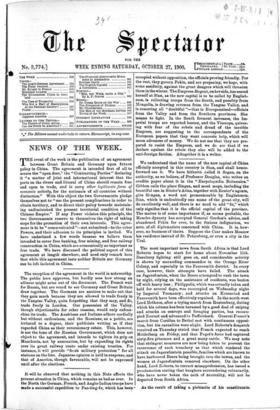The reception of the agreement in the world is noteworthy.
The public here approves, but hardly sees how strong an alliance might arise out of the document. The French wait for Russia, but are vexed to see Germany and Great Britain draw together. The Germans are anxious to make out that they gain much because they are allowed to trade freely in the Yangtse Valley, quite forgetting that they may, and do, trade freely in London. Our possession of the Valley, though objectionable for other reasons, would only enfran- chise its trade. The Austrians and Italians adhere cordially but without enthusiasm, and the Russians, as a public, are irritated to a degree, their publicists writing as if they regarded China as their reversionary estate. This, however, is not the tone of the Russian Government, which does not object to the agreement, and intends to tighten its grip on Manchuria, not by annexation, but by expanding its rights over its great railway route under existing treaties. For instance, it will provide "fresh military protection" for all stations on the line. Japanese opinion is held in suspense, and that of America, though favourable, will not be expressed until after the elections.














































